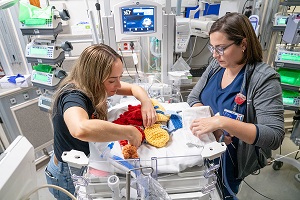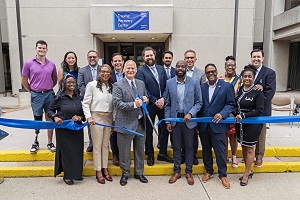Breastfeeding Class Hybrid - In Person with Live Virtual Access- Detroit (Ready, Set, BABY)
Ready, Set, BABY Class intended for patients giving birth at Henry Ford Hospital Detroit This 2 hour Hybrid - In Person with Live Virtual Access...
Your kidneys can fail for many reasons: infection, injury, or conditions like high blood pressure and diabetes. If other treatments do not help or you need dialysis, you also may benefit from a kidney transplant.
Henry Ford performed Detroit’s first-ever kidney transplant in 1968. Our team continually seeks new ways to make kidney transplants safer and recoveries easier for recipients and living donors.
When you come to Henry Ford for a kidney transplant, you benefit from:
The less time you have to wait for a transplant, the greater your chances of success. To speed the process, Henry Ford offers a FAST Track program. Our kidney transplant team is able to complete all of your required medical tests and psychological assessments in one day. We receive your test results back right away so we can quickly place you on the national transplant waitlist.
We partner with the pediatric kidney transplant program at Children’s Hospital of Michigan. When these younger patients reach adulthood, they can continue their transplant care at Henry Ford. Learn more about the Transplant Center at Children’s.
To learn more or request a consult, submit an online form or call: (313) 916-1269.
Ready, Set, BABY Class intended for patients giving birth at Henry Ford Hospital Detroit This 2 hour Hybrid - In Person with Live Virtual Access...
Speak one on one with a C.A.R.E. Program expert that can help you identify resources, address caregiver stress, learn about educational classes,...
Speak one on one with a C.A.R.E. Program expert that can help you identify resources, address caregiver stress, learn about educational classes,...
Ready, Set, BABY Class intended for patients giving birth at Henry Ford Hospital Detroit This 2 hour Hybrid - In Person with Live Virtual Access...


The Detroit-based health system will celebrate the official construction launch of its historic flagship hospital expansion project with a full day of events


Henry Ford Health’s Trauma Recovery Center aims to help survivors recover from the emotional wounds of violent crime and other sudden injury.

Donating your kidney is a procedure that has become increasingly safer due to advancements in medicine, improved surgical techniques and a highly sophisticated donor selection process.

Typically, advanced liver disease occurs in older people. But recently, young people have been developing advanced liver disease due to alcohol consumption. Learn more about this sobering fact--and how much alcohol is considered 'safe.'

If you have diabetes, you’re at high risk of fatty liver disease. Learn what it is and how you can help prevent it.
We use cookies to improve your website experience. By using this site, you agree to our Terms of Use. Read our Internet Privacy Statement to learn what information we collect and how we use it.